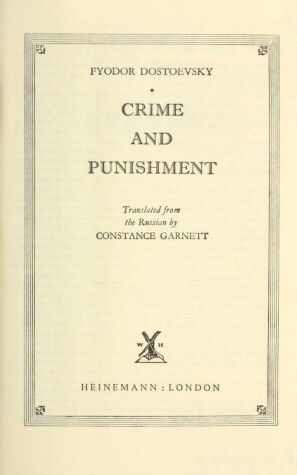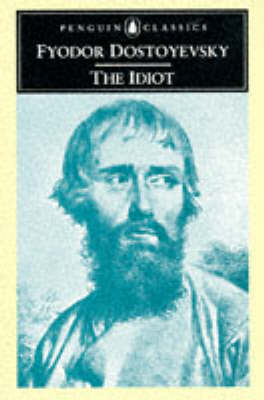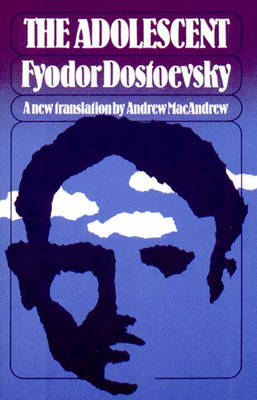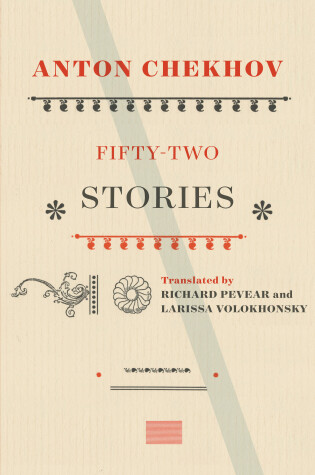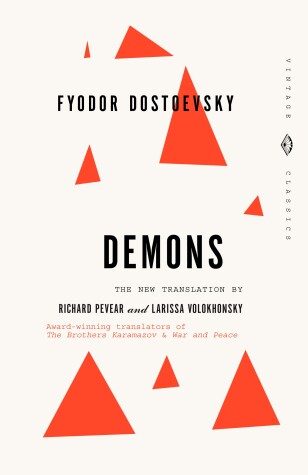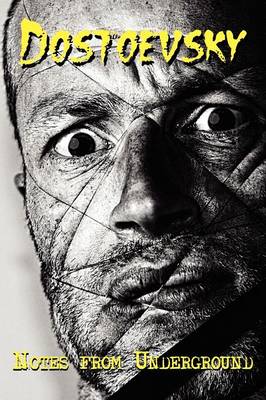Vintage classics
6 total works
Nominated as one of America’s best-loved novels by PBS’s The Great American Read
With the same suppleness, energy, and range of voices that won their translation of The Brothers Karamazov the PEN/Book-of-the-Month Club Prize, Pevear and Volokhonsky offer a brilliant translation of Dostoevsky's classic novel that presents a clear insight into this astounding psychological thriller. "The best (translation) currently available"--Washington Post Book World.
With the same suppleness, energy, and range of voices that won their translation of The Brothers Karamazov the PEN/Book-of-the-Month Club Prize, Pevear and Volokhonsky offer a brilliant translation of Dostoevsky's classic novel that presents a clear insight into this astounding psychological thriller. "The best (translation) currently available"--Washington Post Book World.
Prince Myshkin, a good yet simple man, is out of place in the corrupt world created by Russia's ruling class.
The fourth of Dostoevsky's novels, this is the story of a 19-year old searching for identity amid the disorder of Russian society in the 1870s. The illegitimate child of a landowner, Arkady travels to St. Petersburg in search of a secret goal - and of a relationship with his father.
From the celebrated, award-winning translators of Anna Karenina and The Brothers Karamazov: a lavish volume of stories by one of the most influential short fiction writers of all time
Anton Chekhov left an indelible impact on every literary form in which he wrote, but none more so than short fiction. Now, renowned translators Richard Pevear and Larissa Volokhonsky give us their renderings of fifty-two Chekhov stories. These stories, which span the complete arc of his career, reveal the extraordinary variety and unexpectedness of his work, from the farcically comic to the darkly complex, showing that there is no one single type of “Chekhov story.” They are populated by a remarkable range of characters who come from all parts of Russia and all walks of life, including landowners, peasants, soldiers, farmers, teachers, students, hunters, shepherds, mistresses, wives, and children. Taken together, they demonstrate how Chekhov democratized the form.
Included in this volume are tales translated into English for the first time, including “Reading” and “An Educated Blockhead.” Early stories such as “Joy,” “Anguish,” and “A Little Joke” sit alongside such later works as “The Siren,” “Big Volodya and Little Volodya,” “In the Cart,” and “About Love.” In its range, in its narrative artistry, and in its perceptive probing of the human condition, this collection promises profound delight.
Anton Chekhov left an indelible impact on every literary form in which he wrote, but none more so than short fiction. Now, renowned translators Richard Pevear and Larissa Volokhonsky give us their renderings of fifty-two Chekhov stories. These stories, which span the complete arc of his career, reveal the extraordinary variety and unexpectedness of his work, from the farcically comic to the darkly complex, showing that there is no one single type of “Chekhov story.” They are populated by a remarkable range of characters who come from all parts of Russia and all walks of life, including landowners, peasants, soldiers, farmers, teachers, students, hunters, shepherds, mistresses, wives, and children. Taken together, they demonstrate how Chekhov democratized the form.
Included in this volume are tales translated into English for the first time, including “Reading” and “An Educated Blockhead.” Early stories such as “Joy,” “Anguish,” and “A Little Joke” sit alongside such later works as “The Siren,” “Big Volodya and Little Volodya,” “In the Cart,” and “About Love.” In its range, in its narrative artistry, and in its perceptive probing of the human condition, this collection promises profound delight.
Inspired by the true story of a political murder that horried Russians in 1869, Fyodor Dostoevsky conceived of Demons as a "novel-pamphlet" in which he would say everything about the plague of materialist ideology that he saw infecting his native land. What emerged was a prophetic and ferociously funny masterpiece of ideology and murder in pre-revolutionary Russia.
“The political cataclysms and cultural revolutions of our century . . . confirm the status of Notes from Underground as one of the most sheerly astonishing and subversive creations of European fiction.”—from the Introduction by Donald Fanger
“I am a sick man . . . I am a spiteful man,” the irascible voice of a nameless narrator cries out. And so, from underground, emerge the passionate confessions of a suffering man; the brutal self-examination of a tormented soul; the bristling scorn and iconoclasm of alienated individual who has become one of the greatest antiheroes in all literature. Notes From Underground, published in 1864, marks a tuming point in Dostoevsky's writing: it announces the moral political, and social ideas he will treat on a monumental scale in Crime And Punishment, The Idiot, and The Brothers Karamazov. And it remains to this day one of the most searingly honest and universal testaments to human despair ever penned.
“I am a sick man . . . I am a spiteful man,” the irascible voice of a nameless narrator cries out. And so, from underground, emerge the passionate confessions of a suffering man; the brutal self-examination of a tormented soul; the bristling scorn and iconoclasm of alienated individual who has become one of the greatest antiheroes in all literature. Notes From Underground, published in 1864, marks a tuming point in Dostoevsky's writing: it announces the moral political, and social ideas he will treat on a monumental scale in Crime And Punishment, The Idiot, and The Brothers Karamazov. And it remains to this day one of the most searingly honest and universal testaments to human despair ever penned.
